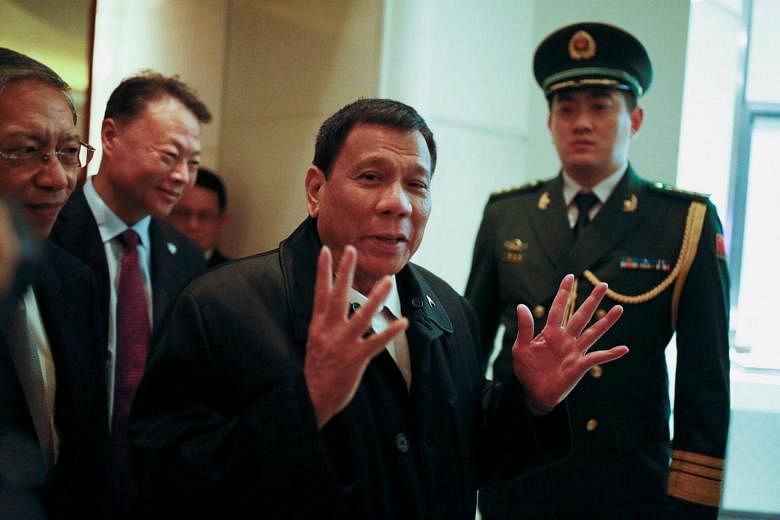MANILA • Philippine President Rodrigo Duterte's outbursts against the United States have left Americans and their businesses in the Philippines jittery about their future, said American Chamber of Commerce of the Philippines executive director Ebb Hinchliffe.
"Every time he opens his mouth and says something negative about America, that hurts me personally... and from a business standpoint, it's not helping," he said.
Three trade delegations representing US technology, financial services and manufacturing companies had cancelled trips to the Philippines in recent weeks, he added.
At least two American companies have opted to do business in Vietnam "because of the President's anti-American sentiment", Mr Hinchliffe said, without naming them.
Since taking office on June 30, Mr Duterte has sought to reshape his nation's foreign relations by pivoting towards China and Russia.
Accompanied by a business delegation of at least 200, he arrived in Beijing yesterday on a state visit, during which he seeks to open a new commercial alliance with China aimed at boosting the Philippine economy.
Despite his anti-US rhetoric, an opinion poll showed yesterday that people in the Philippines still trust the US far more than China.
Though trust in both countries had declined slightly since the last survey in June, a Social Weather Stations poll conducted from Sept 24 to 27 showed that 55 per cent of Filipinos had "little trust" in China, versus 11 per cent who had doubts about the US.
Just over three-quarters, or 76 per cent, of the 1,200 respondents had "much trust" in the US, compared with 22 per cent who felt the same about China. The poll did not ask respondents to explain their views.
The June poll had shown that 81 per cent had "much trust" in the US and 9 per cent had "little trust". Feelings about China were better at the time, with 27 per cent having high trust and 51 per cent little trust.
The US effectively ruled the Philippines from 1898, when it acquired the country from Spain, until recognising its independence in 1946.
About four million people of Philippine ancestry live in the US, forming one of the country's largest minorities, and about 220,000 Americans, many of them military veterans, live in the Philippines. Another 650,000 visit each year, according to US State Department figures.
A Pew Research Centre study last year said the Philippines is the most pro-US country in the world.
But despite the shared history, the Philippines has a strong nationalistic movement that has questioned the US alliance. In 1991, the government asked Washington to vacate the Subic Bay naval facility and the nearby Clark Air Base.
But as tensions increased with China over the territorial dispute in the South China Sea, the Philippines signed an Enhanced Defence Cooperation Agreement with the US in 2014 that grants Washington increased military presence through the rotation of ships and aircraft for humanitarian and maritime security operations.
Mr Duterte has said the agreement will be reviewed and insists that his country, the third-largest Asian recipient of US military aid after Pakistan and Afghanistan, can do without assistance.
REUTERS

